人教版高中英语必修四教案unit1 Language points (I)
人教版高中英语必修四Unit1 Language points导学案
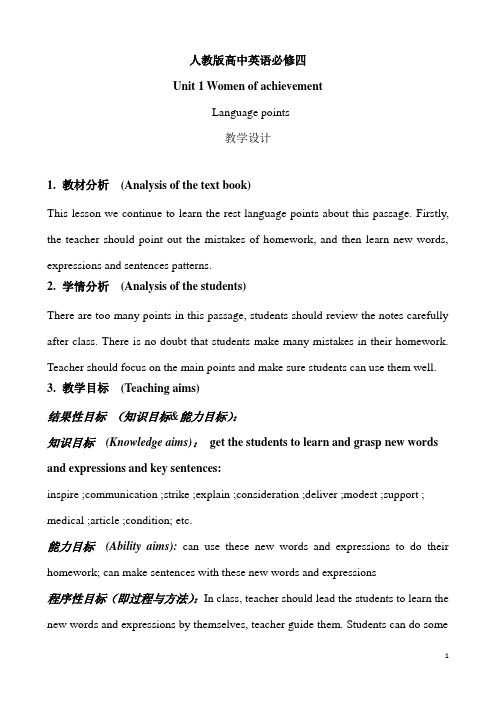
人教版高中英语必修四Unit 1 Women of achievementLanguage points教学设计1.教材分析(Analysis of the text book)This lesson we continue to learn the rest language points about this passage. Firstly, the teacher should point out the mistakes of homework, and then learn new words, expressions and sentences patterns.2.学情分析(Analysis of the students)There are too many points in this passage, students should review the notes carefully after class. There is no doubt that students make many mistakes in their homework. Teacher should focus on the main points and make sure students can use them well.3.教学目标(Teaching aims)结果性目标(知识目标&能力目标):知识目标(Knowledge aims):get the students to learn and grasp new words and expressions and key sentences:inspire ;communication ;strike ;explain ;consideration ;deliver ;modest ;support ; medical ;article ;condition; etc.能力目标(Ability aims):can use these new words and expressions to do their homework; can make sentences with these new words and expressions程序性目标(即过程与方法):In class, teacher should lead the students to learn the new words and expressions by themselves, teacher guide them. Students can do someexercise in the class, such as make sentences, translation.体验性目标(情感目标):情感目标(Emotional aims):Stimulate the students in learning English and develop the students’ spirit of cooperation and teamwork.4.教学重点和难点(important points and difficult points)Important points: all new words and expressions in this lessonDifficult points: Enable students to learn and use these phrases:inspire ;communication ;strike ;explain ;consideration ;deliver ;modest ;support ;medical ;article ;condition ;etc.5. 教学流程(Teaching procedures)Step1. Listen to the text and ask some students to translate some sentences.Step2. Learn some language points.1. inspire vt.鼓舞;感动;激发;启示1. His speech inspired us to try again.他的演讲鼓舞了我们再作尝试.2. His spirit inspires us to work hard to achieve more in our life.[拓展]:inspiration (n.) 灵感鼓舞,激发,inspiring adj.鼓励人的鼓舞人心的,振奋人心的inspired (adj.) 有创作力的受到鼓舞的,有灵感的inspire sb. to(do)sth.鼓舞某人去做某事inspire sth in sb. / inspire sb. with sth使某人产生(感觉),激起……1. I was inspired to work harder than ever before.我受激励比以往任何时候都更加努力地工作。
高中英语 unit1 language points课件新人教版必修4

7.Work out (1) 理解,说出, 判断 I can’t work out the meaning of the poem. The map is wrong. I can’t work out where we are now. (2) (情况等)发展,进行 Things have worked out badly 情况不妙。
Sensitive people don’t think ________ things which are not needed even at a low price. (值得买) (worthwhile) 答案:it (is) worthwhile to buy / buying
比较:
(1) be (well) worth doing The book is well worth reading. (2) worthy adj. be worthy of sth. of being done to be done
(2) in connection with 关于,有关 ( police are qestioning the two men in The connection with the bank robbery. He asked me many questions in connection with life in Britiain. there is any connection Do you think ___________ between the two cases of murder?(有关系)
If you don’t know___________ yourself at table in foreigh country, you should copy the host.(如何守规矩) 答案: how to behave Generally speaking , those _____ at school are usually popular with their parents at home. (表现好) 答案:who behave themselves well
人教版高中英语必修4Unit1__Learning__about__language1参考教案

Unit1 Learning about language1参考教案Teaching objectives1. Master the common suffixes transforming verbs into nouns:-ment, -ation, -ion, -ist, -er, -or, -ant, -ee, -ance, -ure2. Study and master the key words & phrases in this unit.Teaching procedures & waysI. Homework checkingShare your writing with our group. Check with each other.II. Word formation1.Fill in the chart with a suitable verb or noun form. Pay attention to the connection between them. (p.4 Ex. 2)2. Work in groups to discuss how verbs can be changed into nouns-ment -ation -ion -ist•agree--- move---•appreciate--- examine---•admit--- educate---•tour--- type---3. Can you summarize other suffixes? Give examples if you can.-er -or -ant -ance -ee -urework--- drive--- advise---act--- conduct--- sail---attend---admit--- attend--- guide---employ--- train---depart --- press--- fail---III.VocabularyWork in groups and study the words and expression_r_rs. Try to summarize the usages. Then make sentences by yourselves.1.achieve sth (success, goal, aim, purpose, etc)1) He achieved his ambition of making a robot.2) Because he was hard-working, he achieved full marks in the exam. n. achievement1) The achievement as a teacher is to show his students how to learn.2) A sense of achievement will encourage students to make more efforts.2.campaign3.dress4. put… to death5.deliver6.behave7.argue8.worthwhile9.observe10.lead a… life11.crowd in12.look down upon13.intend14.carry onIV. Practise1. Complete the sentences with the words in their proper forms.1) A sense of_______ (achieve) is very important for a student.2) It is strange that the old lady is_______ (dress) in red.3) His life _________ (devote) to helping the poor.4) It is worthwhile_______(walk) to work every day.5) The school being built is_________(intend) for the homeless children.2. Complete the passage-Ex2 p42V. Summary and homework1. Summarize noun suffixes.2. Finish Exercises 1 and 3 on page 42.Reflection:。
高中英语 Unit1 language points导学案 新人教版必修4

高中英语 Unit1 language points导学案新人教版必修4language points导学案【学习目标】1、掌握7个单词、3个短语、3个句型的用法,提高在语境中运用的能力。
2、自主学习,合作探究;掌握概括框架知识和正确运用的方法。
3体会用英语表达思想的快乐,并全力以赴,激情投入。
附:所有同学必须记住所有单词的例句,掌握归纳知识树的方法【使用说明及学法指导】1、20分钟自主学习、理解并熟记基本用法。
2、15分钟合作探究,建立每个词条的知识树。
3、10分钟成果展示点评课内探究案的内容, 巩固落实、当堂检测。
4、掌握单词短语的用法,学会对比记忆的方法,联系生活实际灵活运用所学知识。
课前预习案【自主学习】----大声读重点单词1、achievementn、[C]成就;功绩;\[U\]实现;完成;达到联想拓展achieve v、取得,实现achieve an aim/a goal达到目标achieve success 获得成功He received the Nobel Prize for his scientific achievements、他因科学上取得的成就而获得诺贝尔奖。
Flying across the Atlantic for the first time was a great achievement、首次飞越大西洋是一个伟大的功绩。
①没有人民的支持,我们将一事无成。
Without the support of the people we can 、②我只完成了我所希望完成的工作的一半。
I have achieved only half of I hope to do、③祝贺你获得这样完美的胜利。
Congratulations to you (介词) such a complete victory、2、 behave vi、举止,行为,表现;(机器等)工作,运转(常与well/badly等副词连用) vt、守规矩;举止有礼常用结构:behave oneself 使某人自己举止规矩Behave yourself; don’t make a fool of yourself、注意你的举止, 别闹出笑话来。
2019新人教高中英语选择性必修四Unit1Learning about Language公开课教案
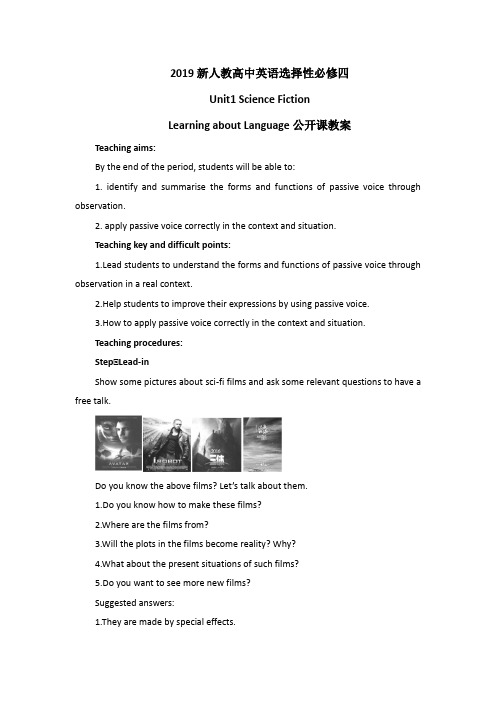
2019新人教高中英语选择性必修四Unit1 Science FictionLearning about Language公开课教案Teaching aims:By the end of the period, students will be able to:1. identify and summarise the forms and functions of passive voice through observation.2. apply passive voice correctly in the context and situation.Teaching key and difficult points:1.Lead students to understand the forms and functions of passive voice through observation in a real context.2.Help students to improve their expressions by using passive voice.3.How to apply passive voice correctly in the context and situation.Teaching procedures:StepⅠLead-inShow some pictures about sci-fi films and ask some relevant questions to have a free talk.Do you know the above films? Let’s talk about them.1.Do you know how to make these films?2.Where are the films from?3.Will the plots in the films become reality? Why?4.What about the present situations of such films?5.Do you want to see more new films?Suggested answers:1.They are made by special effects.2.They are usually adapted by science fiction novels.3.No, because they are created by humans.4.Recently, more and more such excellent films have been produced to the public and they play an important role in the film industry.5.略StepⅠAnalyse and identifyTask1Share your thoughts on the sci-fi films with the help of the following sentences and find out the basic form of passive voice.1.The sci-fi films are attractive because they (make) by some special effects.ually, they (adapt) by some science fiction novels, just like I, Robot written by Isaac Asimov.3.The effects in the films are so powerful that people often think they will be real things that will(see) in the future.4.Actually, they won’t become reality because they (create) by humans.5.Recently, more and more such excellent films have (produce) to the public and they play an important role in the film industry.6.As fans of sci-fi films, we expect more films can (make) to feast our eyes.Suggested answers:1.are made2.are adapted3.be seen4.are created5.been produced6.be madeTask2Change the following sentence into active voice to analyse the function of passive voice.Actually, they won’t become reality because they are created by humans.Suggested answers:Actually, they won’t become reality because we humans create them.Task3Translate the following sentences to find out varied forms of passive voice.1.The effects in the films are so powerful that people often think they will be real things that will be seen in the future.2.Recently, more and more such excellent films have been produced to the public and they play an important role in the film industry.3.As fans of sci-fi films, we expect more films can be made to feast our eyes.Varied forms:Suggested answers:1.电影中的特效是如此强大,使得观众常会觉得它们会成为未来能够见到的真实的东西。
人教版高中必修四英语 unit1全单元教案

人教版高中必修四英语Unit1Women of achievementThe First Period: Warming UpTeaching Goals:1. Target Languagea. 重点词汇Achieve, achievement, condition, welfare, institute, connection, campaign, organization, specialist, devote ... to, put death to, concernb. 重点句子(1). She concerned herself with welfare projects, leading China Welfare Institute especially for women and children.(2). She is a doctor who became a specialist in women’s illnesses.(3). She devoted all her lift to medical work for Chinese women and children.(4). Jody Williams helped found an international campaign to stop the use of landmines.(5). Her research showed the connections between chimps and human beings.2. Ability Goalsa. To know how to tell the great person.b. Learn the way to describe a person from what the person did, where she comes from, what her nationality is and so on.3. Learning Ability GoalsTeach students how to describe a person.4. Teaching Important Pointsa. By the guessing game, students will know some great women in the world and when describing a person, which aspects should be include.b. Ask students to discuss personal qualities of the great people.5. Teaching Difficult PointsLet students analyze the person qualities of the great people and make them believe everyone can be great as long as they have these qualities.6. Teaching MethodsInspiration, Questioning and Discussion.7. Teaching AidsA laptop, a blackboard and chalks.Teaching ProceduresStep 1: Lead-inAsk students to answer this question: can you name some famous women? Why do you think they are great? Step 2: Having a Guessing GameDescribe some people and guess who they are according to the description.1.(1)She remains the most remarkable, influential and mysterious woman in Chinese history.(2).She was the only female monarch of China.The key: Empress(女皇) Wu Zetian (624 - 705) in Tang Dynasty2. (1) she was an inventor and a scientist from Poland.(2) She went to Paris and studied physics and chemistry there.(3) She is the only woman scientist who was awarded two Nobel Prizes(4) On July 4, 1934, she died in Paris, killed by her own experiments. She died of radiation poisoning.The Key: Marie Curie (1867-1934)3. (1) She was born in Chicago, Illinois.(2) She graduated from Yale law school.(3) She was the first lady of the United States from 1993 to 2001.(4) Now, She is the secretary of USA.The Key: Hillary Clinton (1947- ), United States4. (1) She was one of the top leaders in modern Chinese history.(2) She concerned herself with welfare projects, leading China Welfare Institute especially for women andchildren.(3) She was Dr Sun Yat-sen’s wife.The Key: Soong Chingling (1893-1981),5. A doctor who became a specialist in women’s illnesses. She devoted all her li ft to medical work for Chinese women and children. Her work encouraged many other women to become doctors.The Key: Lin Qiaozhi6. A girl from the countryside who dressed as a man and went to fight for the French and to drive the English out of France. She was caught and put to death by the English.The Key: Joan of Arc (1412-1432)7. (1) She was a Quaker. She helped improve prison conditions and gave prisoners work and condition.(2). her work helped the Quakers get the Nobel Peace Prize in 1947.The Key: Elizabeth Fry (1780-1845)8. She helped found an international campaign to stop the use of landmines. She worked hard to make as many countries as possible agree not to use them. She and her organization were given the Nobel Peace Prize in 1997. The Key: Jody Williams (1950- )9. As a young girl, she always wanted to study animals. She went to Africa and studied chimps. Her research showed the connections between chimps and human beings. She works to protect chimps everywhere.The Key: Jane Goodall (1934- ),Step 3: Words Explanation1. QuakerA religious sect that worships Christ without any formal ceremony or stated creed and is strongly opposed to violence and war2. concern (vt):have an effect onThis doesn’t concern us.那与我们无关。
人教版高中英语必修4 unit1 Language points
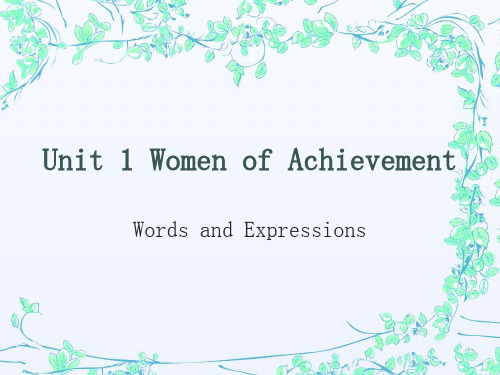
16. inspire
adj: inspired / inspiring n. : inspiration She was an inspiration to all of us. Her __________speech yesterday made us_________. We are determined to learn from her and try to do our job better. He was an ____ poet at that time and his ____ poems spread through all the country. A. inspired; inspired B. inspiring; inspired C. inspired; inspiring D. inspiring; inspiring
9. connect
Connect A with/to B Combine A wi11.behave
(1)行为;举止 )行为; 她表现出了很大的勇气 She behaved with great courage. 他对顾客的态度不好 He __________________to the customers (2) vi. (指事物)有某种作用 指事物) 我的摄像机自从修好后一直很正常。 我的摄像机自从修好后一直很正常。 My camera_________________________ since it was repaired. (3)behave oneself (4) behavior
4. concern
concern oneself with sth 使担心,使挂念 使担心, show concern about be concerned about 对…关心 关心 be concerned with 与…相关 …相关 concerning: 关于 regulations concerning price
人教版必修4 Unit 4 P1Part 1 Teaching Design教案
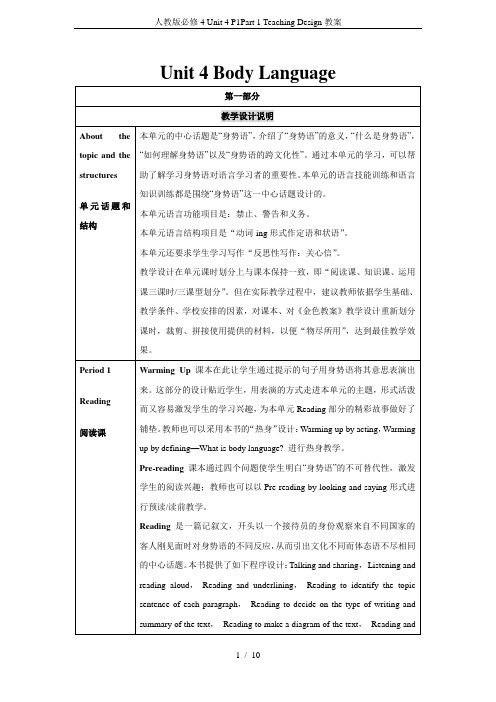
Unit 4 Body LanguagePart 1 Teaching Design第一部分教学设计Period 1 A sample lesson plan for reading(COMMUNICATION: NO PROBLEM?) IntroductionIn this period, after the warming up, students will first be guided to talk and share. Then comes listening and reading aloud,reading and underlining,reading to identify the topic sentence of eachparagraph,reading to decide on the type of writing and summary of the text,reading to make a diagram of the text and reading and understanding difficult sentences. The period ends in students checking cues.ObjectivesTo help students understand the text’s forms and cont ents and learn about body languageTo help students communicate on the topic in focus with the words, expressions and structures learned in this unitFocusAidsMultimedia facilities, tape-recorder, photos, diagramsProcedures1. Warming upWarming up by actingLook at the list of interpretation on the right side of the chart. Perform the action or the nonverbal behavior on the left side.Examples of Body LanguageWarming up by defining—What is body language?2. Pre-reading by looking and sayingLook at the man in the picture below. What does he say to you by his bodylanguage?Basically, how the ...... do I know? Or, I don’t know nothing! Theshoulders are hunched and the hands are open signifying a big questionmark.3. Talking and sharing*Body language is the quiet, secret and most powerful language of all!*According to experts, our non-verbal language communicates about 50% of what we really mean (voice tonality contributes 38%) while words themselves contribute a mere 7%.*Our bodies send out messages constantly and often we don’t recognize that we’recommunicating a lot more than we realize.*Our understanding and use of non-verbal cues in facial expression are familiar to us nearly from birth4. Listening and reading aloudReading aloud to the recording of the text improves our literacy skills -- reading, writing, speaking, and listening. Now please listen and then read aloud to the recording of the text COMMUNICATION: NO PROBLEM? Pay attention to the pronunciation of each word and the pauses within each sentence.5. Reading and underliningA really useful way to help us with our listening is to become aware of 'thought groups' .When we speak, we need to divide speech up into small 'chunks' to help the listener understand messages. These chunks or thought groups are groups of words which go together to express an idea or thought. In English, we use pauses and low pitch to mark the end of thought groups.Next you are to read the text, dividing the text into thought groups and circling all the useful expressions or collocations in the passage. Copy them into your notebook after school as homework.6. Reading to identify the topic sentence of each paragraphNext you are to skim the text to identify the topic sentence of each paragraph.7. Reading and transferring informationRead the text again to complete the table. Where is he/ she from? What does he/ she do when he/ she meets someone at the airport for the first time?For reference8. Going over the text for the type of writing and summary of the textDetermining the type of writing will help you determine the author’s topic (subject), purpose (why he is writing), style (how he should write) and tone (his attitude toward his subject - supportive, condemning, objective, etc.)9. Reading the text again to make a diagram of COMMUNICAATION: NO PROBLEM?10. Reading and understanding difficult sentencesAs you have read the text times, you can surely tell which sentences are difficult to understand. Now put your questions concerning the difficult points to the teacher. 11. Closing down by checking basic non-verbal cuesTo end the class, turn around in class and check some of the basic non-verbal cues in your students and you’ll recognize that you already speak and translate much of the language.“I’m surprised!” “I’m shocked!” “I’m sad!”。
必修4 unit 1教学设计

Women of achievement (Teaching Design)(人教版高中英语课本必修四第一单元)Teaching material analysis:The topic of the unit is “women of achievement”. It shows the achievements and contributions of six great women in different countries in different times, as well as the problems they had to overcome. It tells students the importance of respecting and protecting wildlife. More importantly, it helps students learn the roles that women play in the society and build up their confidence, responsibility and right views of society and gender. It encourages students to think about their own future plans and how to achieve them. Students should learn to use some adjectives to describe a great person and understand the reading passage. They should also be required to retell the text in their own words. The class aims to develop students’ different reading skills and self-confidence, and encourage them to learn from great women.Teaching important points:1.Have students learn about some great women and their achievements.2.Get students to learn different reading skills.Teaching difficult points:1.Develop students’ reading ability.2.Enable students to talk about women of achievement.Teaching aims:1. Knowledge aims:1) Have students master the useful new words and expressions in this part.2) Let students learn to use some adjectives to describe a great person.3) Let students learn about some great women and their achievements in different fields in the world.4) Have students learn something about law: "Wildlife protection law of the People's Republic of China"2. Ability aims:1) Have students learn to use some reading skills such as predicting, skipping, note-taking, skimming and scanning.2) Enable students to talk about women of great achievement.3. Emotional aims:1) Enable students to learn from great women, stimulate their love and respect for great women and develop their moral qualities.2) Develop students’ sense of cooperative learning.Teaching methods:Cognitive approach, task-based approachTeaching procedures:Step I Leading inHave a free talk with students. Ask them the following questions:1.Do you know any great people or important people?2. What makes a great person?(suggested answers :cleaver, brave, determined, confident,hard-working, unselfish, kind, active, generous)Step II Warming upGet students to look at the pictures on the screen and answer thequestions:1) Do you know these women? Who are they?2) Are they great or important? Why?3) What’s the difference between a famous person and a great person?Step III Pre-reading1.Let students discuss the following questions:Why do you think Jane Goodall went to Africa to study chimps ratherthan to university? Do you think she is right?2.Ask students to look at the title and pictures of the passage to predictwhat the text talks about.Step IV ReadingTask 1 Skimming for the main idea of the whole passage:(suggested answer: It talks about how Jane Goodall worked with chimps intheir environment and helped people understand and respect the life ofthe animals.)Task 2 Read the text quickly again to find the general idea of eachparagraph. Para 1. A day in the park.Para 2. Jane’s way to study chimps and her achievement.Para 3. Jane’s attitude to the animals.Para 4. Jane has achieved everything she wanted to do.Task 3 Let students read the text a third time and then work in pairs todiscuss the following questions with partners:1)What do you think Jane is called a student of African wildlife?2)What did Jane have to give up when she went to live in the forest?3)Do you think it is important to study chimps in the wild rather thanin the zoo? Give reasons.4)Do you think you will go if you are asked to study animals in the wild? Why or why not?Task 4 Help students analyze some difficult, long and complex sentences. Encourage them to guess the meanings of some new words and phrases. Ask them to try to deal with the language points in the context.1)Following Jane’s way of studying chimps, our group are all going to visit them in the forest.2)She spent years observing and recording their daily activities.3)Only after her mother came to help her for the first months was she allowed to begin her project.4)For forty years Jane Goodall has been outspoken about making the rest of the world understand and respect the life of these animals.Step V ComprehendingComplete the sentences according to the passage.1.What did the group do first in the morning?2.They___________. (suggested answer: observed the family of chimps wake up)3.Why did Jane go to Africa to study chimps in the wild? Because she wanted _________.4.(suggested answer: to work with them in their own environment)5.Jane was permitted to begin her work after_________.(suggested answer: her mother came to support her)Step VI Post reading1.DiscussionHave students in small groups discuss the following questions:1)What should we learn from Jane Goodall?2)What made her a great success?3)Do you agree with Jane’s idea? Why or why not?4)What do you think is the best way to protect wildlife?2.DebateDivide students into two groups---boys and girls. Let them debate with each other about the topic: Women are able to do more than men. Right or wrong? Why ?Step VII Summary1.Ask some students to retell the story of Jane Goodall in your own words.2.The teacher summarize:Follow the example of Jane Goodall. Be a dreamer and fight for our dreams. Make our contributions to protect the wildlife. Try our best to change the world better.Step VIII HomeworkDo you think the article is well organized? Give your reasons.Reflection after class:In the first two steps,the pictures and the questions aroused students’interest in the lesson. The reading activities help to develop students’reading ability, and the reading material tells students the importance of respecting and protecting wildlife. More importantly, Jane Goodall’s story helps students realize the roles women play in the society and build up their confidence, responsibility and right views of society and gender. Students will develop moral qualities by learning from great women. The diverse activities in the class are good for developing students’different reading skills and their sense of cooperative learning.。
高中英语必修四Unit1教案
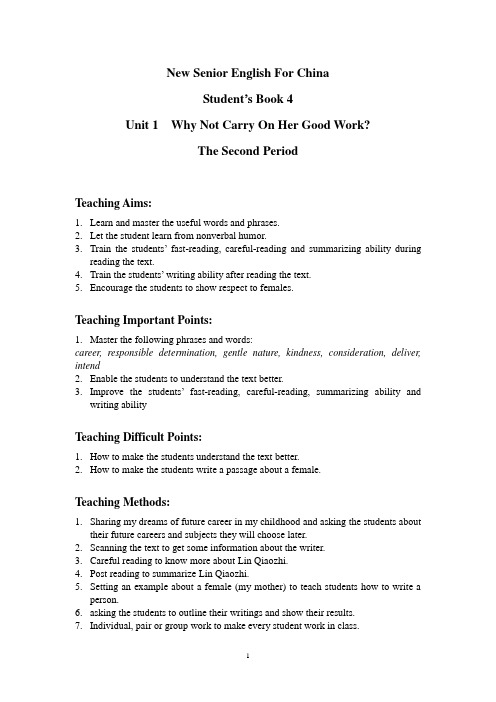
New Senior English For ChinaStudent’s Book 4Unit 1 Why Not Carry On Her Good Work?The Second PeriodTeaching Aims:1.Learn and master the useful words and phrases.2.Let the student learn from nonverbal humor.3.Train the students’fast-reading, careful-reading and summarizing ability duringreading the text.4.Train the students’ writing ability after reading the text.5.Encourage the students to show respect to females.Teaching Important Points:1.Master the following phrases and words:career, responsible determination, gentle nature, kindness, consideration, deliver, intend2.Enable the students to understand the text better.3.Improve the students’fast-reading, careful-reading, summarizing ability andwriting abilityTeaching Difficult Points:1.How to make the students understand the text better.2.How to make the students write a passage about a female.Teaching Methods:1.Sharing my dreams of future career in my childhood and asking the students abouttheir future careers and subjects they will choose later.2.Scanning the text to get some information about the writer.3.Careful reading to know more about Lin Qiaozhi.4.Post reading to summarize Lin Qiaozhi.5.Setting an example about a female (my mother) to teach students how to write aperson.6.asking the students to outline their writings and show their results.7.Individual, pair or group work to make every student work in class.Teaching Aids:1. a multimedia classroom2.the blackboardTeaching Procedures:Step Ⅰ GreetingsGreet the whole class as usual.Step Ⅱ Leading-in and Pre-reading1. Share my secret: my dreams of future career in my childhood (pictures: doctor, policewoman, driver, cook, stewardess and teacher)2. Ask the students about their future careers (Have you thought about your future career?Have you decided which subject you will choose among the seven subjects?)3. The writer has the same problem. Ask the students to spend 1 minute skimming and find out the answers to the questions. (1. What was the writer’s problem? 2. Who helped the writer to make such a decision?3. What did the writer decide to do at last?4. Why did the writer carry on her good work?)If the students can not answer the questions quickly, the teacher should give some tips on how to skim.Step Ⅲ Reading1.Read some words that Lin Qiaozhi once said and feel her responsibility.“I am the doctor on duty whenever and wherever. No matter when and no ma tter where, saving women and children is always my responsibility.”“我随时随地都是值班医生,无论是什么时候,无论在什么地方,救治危重的孕妇,都是我的职责。
人教高中英语必修四全册教案

Unit 1 Women of AchievementI.教学内容分析本单元的话题是“取得成就的优秀女性”,通过介绍几位不同国度、不同时代、不同职业、不同理想与追求、不同经历的杰出女性,探讨了女性对社会、对人类的价值和贡献,展示了女性的风采和她们在社会各个领域的成就。
学习本单元有助于提高对妇女社会角色的认识,了解成功女性的奋斗经历和勇于斗争的精神,培养学生(尤其是女生)的事业心和社会责任感,建立正确的性别观和和自信心。
.教学步骤Period 1 Learning about Language (1) & Warming Up Teaching Goals:1. To develop Ss’ ability of using words and expressions and speaking.2. To Prepare Ss’ for the new unit.Teaching Procedures:Step 1. New words and expressionsPurpose: To prepare Ss for the new lessons.1. Ask Ss to listen to the tape of Reading and read after the tape.2. Ask Ss to read new words aloud and try to keep them by heart.3. Ask Ss to make sentences with the following words and expressions.Step 2. Words usingPurpose: To develop Ss’ ability of using new words and expressions.To develop Ss’s ability of creating words.1. Words using competition(1) Read the following ten meanings of the new words in this unit and ask Ss to guess the new words and spell them. Ss should put up their hands as quickly as possible. The student who does best will win the game.Suggested Answers:① achieve ② condition ③ connection ④ specialist ⑤ inspire⑥argue ⑦observe ⑧look down upon/on ⑨explain ⑩ considerate(2) Ask Ss to finish the Ex1 on P4 as quickly as possible. After they finish it, ask them to discuss in pairs and then check the answers with the class.Suggested Answers:1.bond 2.nest 3.institute 4.crowd in 5.childhood 6.outspoken7.move off 8.welfare 9.project2. Discussion(1) Ask Ss to finish Ex2 on P4 and then check the answers.(2) Ask Ss to observe the words and discuss the meaning of each word in Ex1.(3) Ask Ss to remember some common suffixes of the noun, suchas–tion, - ist, -or(er), -ment, -ing (4)Ask Ss to finish Ex3on P4.Step 3. Warming UpPurpose:To let Ss’ know how to describe and evaluate a person correctly.To develop Ss’ ability of speaking.1. Leading-inPurpose: To arouse Ss’ desire for more information about womenof achievement.Discussion:(1) Ask Ss a question and let them discuss freely.How many great women can you think of Who are they(2) Show Ss some pictures of great women and offer Ssquestions to discuss.Do you know these people Who are they Why are they still famous (3) Ask Ss to turn to P1, look at the pictures and read the brief description under each picture.(4) Ask Ss to discuss the following questions in groups of four.Step 4. Talking1. Make a dialogue with a student to help Ss know how to describea person.2. Ask Ss to describe one of the six great women in pairs. One student asks; the other student answers. Use the following expressions to help Ss.Step 5. Homework1. Revise new words and expressions in this unit and finish Ex1, Ex2 and Ex3 in Using Words And Expressions on P42.2. Ask Ss to describe a great woman they are familiar with by making up a dialogue in pairs.Period 2 & 3 Pre-reading, Reading & ComprehendingTeaching Goals:1. To let Ss know about some extraordinary women and learn something from them.2. To develop Ss’ reading skills.Teaching Procedures:Step 1. Homework-checkingPurpose: To prepare Ss for the lesson by reviewing what was learnt last period.To make sure Ss have learned how to describe a great person1. Read the following words and expressions and ask Ss to write them down.2. Ask two pairs of students to act out the dialogue made up by themselves in front of the class.Step 2. Leading-inPurpose: To develop Ss’ interest in wild animals and protecting them.To prepare Ss for learning the new text in the unit.1. Show Ss some pictures of wild animals.2. Ask the following questions and ask Ss to answer the questions as quickly as possible.Step 3. Fast readingPurpose: To develop Ss’ ability of reading.1. Tell Ss that they are going to learn a new lesson about a student of wild life and then show a picture of Jane Goodall. Ask them to guess what the passage talks about.2. Ask Ss to skim the text and find the answers to the following questions.Suggested Answers:(1) She is Jane Goodall.(2) She studies chimps.(3) She carries out her work in the forest instead of in a university.(4) One thing she discovered was that chimps hunt and eat meat. She also discovered how chimps communicate with each other.3. Ask students to read the text fast and finish Ex.1 and Ex.2 on P3.Step 4. ReportStep5. Language points1. Ask Ss to find these sentences in the text and then read aloud.◆Watching a family of chimps wake up is our first activity ofthe day. (Para 1, Line5)◆This means going back to the place where we left the familysleeping in a tree the night before. (Para 1, Line6)◆Jane warns us that our group is going to be very tired anddirty by the afternoon and she is right. (Para 1, Line11)◆However, the evening makes it all worthwhile.(Para.1,Line13)◆Only after her mother came to help her for the first few monthswas she allowed to begin her project. (Para.2, Line4)◆For forty years Jane Goodall has been outspoken about makingthe rest of the world understand and respect the life of these animals. (Para 3, Line1)2. Explain the language points in the above sentences.(1) Watching a family of chimps wake up is our first activity of the day. (Para 1, Line5)V-ing形式可相当于名词在句中作主语,谓语动词用单数。
人教版高中必修四英语Unit1单元教学设计
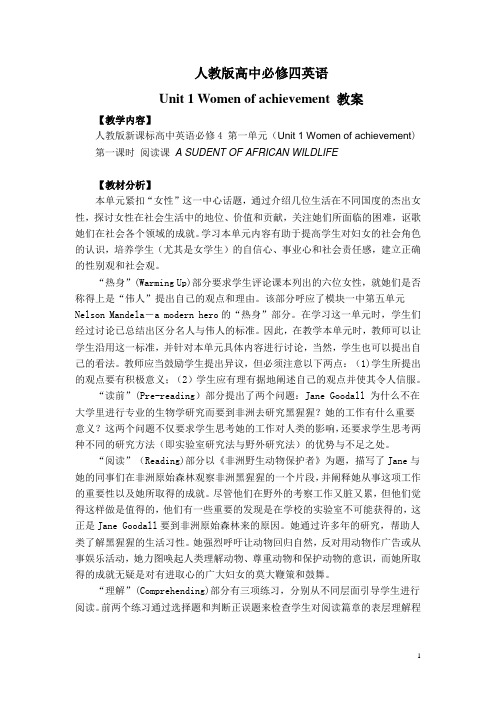
人教版高中必修四英语Unit 1 Women of achievement 教案【教学内容】人教版新课标高中英语必修4 第一单元(Unit 1 Women of achievement) 第一课时阅读课 A SUDENT OF AFRICAN WILDLIFE【教材分析】本单元紧扣“女性”这一中心话题,通过介绍几位生活在不同国度的杰出女性,探讨女性在社会生活中的地位、价值和贡献,关注她们所面临的困难,讴歌她们在社会各个领域的成就。
学习本单元内容有助于提高学生对妇女的社会角色的认识,培养学生(尤其是女学生)的自信心、事业心和社会责任感,建立正确的性别观和社会观。
“热身”(Warming Up)部分要求学生评论课本列出的六位女性,就她们是否称得上是“伟人”提出自己的观点和理由。
该部分呼应了模块一中第五单元Nelson Mandela-a modern hero的“热身”部分。
在学习这一单元时,学生们经过讨论已总结出区分名人与伟人的标准。
因此,在教学本单元时,教师可以让学生沿用这一标准,并针对本单元具体内容进行讨论,当然,学生也可以提出自己的看法。
教师应当鼓励学生提出异议,但必须注意以下两点:(1)学生所提出的观点要有积极意义;(2)学生应有理有据地阐述自己的观点并使其令人信服。
“读前”(Pre-reading)部分提出了两个问题:Jane Goodall 为什么不在大学里进行专业的生物学研究而要到非洲去研究黑猩猩?她的工作有什么重要意义?这两个问题不仅要求学生思考她的工作对人类的影响,还要求学生思考两种不同的研究方法(即实验室研究法与野外研究法)的优势与不足之处。
“阅读”(Reading)部分以《非洲野生动物保护者》为题,描写了Jane与她的同事们在非洲原始森林观察非洲黑猩猩的一个片段,并阐释她从事这项工作的重要性以及她所取得的成就。
尽管他们在野外的考察工作又脏又累,但他们觉得这样做是值得的,他们有一些重要的发现是在学校的实验室不可能获得的,这正是Jane Goodall要到非洲原始森林来的原因。
- 1、下载文档前请自行甄别文档内容的完整性,平台不提供额外的编辑、内容补充、找答案等附加服务。
- 2、"仅部分预览"的文档,不可在线预览部分如存在完整性等问题,可反馈申请退款(可完整预览的文档不适用该条件!)。
- 3、如文档侵犯您的权益,请联系客服反馈,我们会尽快为您处理(人工客服工作时间:9:00-18:30)。
Encourage Ss to do some exercises to master these expressions.
课堂检测内容
新新学案P8&P9词汇集训+句式集训
课后作业布置
第38期Part1目标训练
预习内容布置
Preview the language points on P4-8.
教学手段运用
教学资源选择
新新学案、PPT
教学过程
环节
学生要解决的问题或任务
教师教与学生学
教师个性化修改
Step 1
Lead-in
Step2
Ss’ show
Step 3
Explanation
Step 4
Practice
Recite the sentences learned in crazy English time and can read the new words.
单元(章节)课题
Unit1 Women of achievement
本节课题
Language points (I)
课标要求
Learn to use the useful words and expressions correctly
三维目标
1.Master the useful words, phrases and sentence patterns.
2.Learn the usage of some difficult words and expressions.
3.Train the students’ ability to cooperate with others.
教材分析
The reading passage is a brief introduction of a great woman-- Jane Goodall. Many useful words and expressions are used in this reading passage. This teaching period will encourage students to learn these word and expressions correctly.
教学重难点
1.Master the useful words, phrases and sentence patterns.
2.Learn the usage of some difficult words and expressions.
提炼的课题
Deal with the important language points
Show their answers bravely.
1.Correct their own answers.
2.Take notes about some difficult language points.
Be active to put these important words and xpressions into practice.
学情分析
The students are interested in this great woman, but they have trouble in understanding the reading passage and they actually don’t know how to use the key words and expressions correctly. So they should be offered more chances to use them and master them.
1.Dictate the sentence learned in the morning.
2.Read the words together.
Ask Ss to show their answers on the blackboard.
1.Check their answers.
2.Give careful explanations if any necessary, especially some difficult points.
